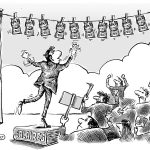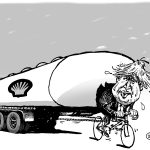Whatever happens…
On this day of the American elections, markets are opting for a clean and flawless victory. Whoever wins, some tough realities will persist.
Too late to gamble, and too early to get an idea of the result of this American election day of November 3, 2020, which still seems quite uncertain. So much so that even the most experienced observers dare not trust the polls, which for many weeks have been giving a clear lead to Joe Biden, the Democratic challenger to the incumbent President.
Whatever the result, harsh economic realities will prevail on the winner. In the short term, the spectacular rebound in activity in the third quarter will not be enough to heal the wounds caused by the COVID-19 pandemic. First because with more than 230,000 already dead, the human toll of the pandemic in the United States is one of the worst for such an advanced economy. Secondly, because the recovery, as strong as it is, will not fully offset the losses of the previous quarter. The US economy is expected to contract by at least 5% this year. Finally, because the rebound has again left many Americans poorer and unemployed.
It seems markets and investors are willing to be satisfied with
a quick and unequivocal presidential result.
While the country is running a deficit of $ 3.3 trillion this year1, or more than 16% of GDP, the next presidential term is likely to be marked by additional spending. On both sides of the political spectrum, it is all about promises of new spending, first as a new plan to support activity and income, second to rebuild the derelict infrastructure. A second budget plan is all the more urgent as the second wave of the pandemic is growing. Only the amount and destination of the budget will depend on the ruling majority or the ability of the executive to bring out a consensus. To this would be added a massive investment plan in infrastructure. The Democratic camp seems more credible on this point because more determined. On the condition, however, of having a majority in Congress. On the Republican side, Donald Trump promises further tax cuts. But his arguments are not as potent as they used to be. The markets now seem even less worried about a tax hike for the richest and for businesses, which they think will be modest anyway. One thing is certain, the country’s debt will continue to grow inexorably. When will the markets worry about it? At its highest since the end of World War II, could public debt end up lowering the dollar’s status? Faced with a more conquering China, how can we not be alarmed?
On the international level, even if a Joe Biden in the White House is expected to seek to re-establish more stable relations with the main world leaders, the Chinese question is now a consensus between the two parties in Congress. Likewise, America’s withdrawal from external theaters of operations has been one of the areas of great continuity since President Obama. Few changes are to be expected in substance, if not in form.
Like outgoing President Trump, who promises the extension of his policies – tax cuts, climate change deregulation, Mexico’s wall etc. The candidate Biden – now favorite – is also promising a continuity … That of his own Vice-Presidency.
But for both of them, times have changed. It seems markets and investors are willing to be satisfied with a quick and unequivocal presidential result, and with a Congress capable of functioning from the January inauguration.
More than continuity or rupture in politics, it is the stability and solidity of the institutions that they now expect from this election, whatever happens.
1 According to the September report of the Congressional Budget Office



